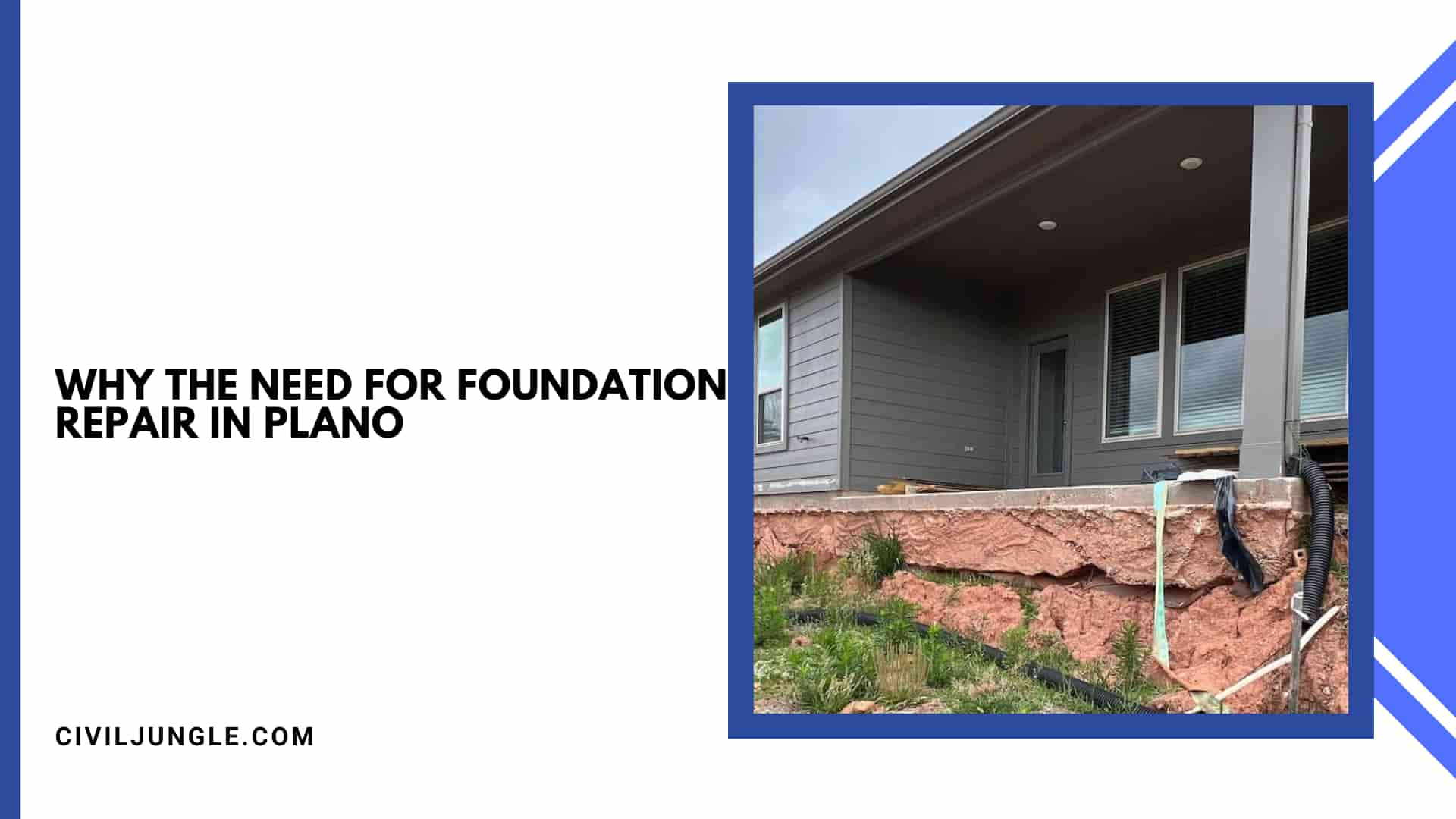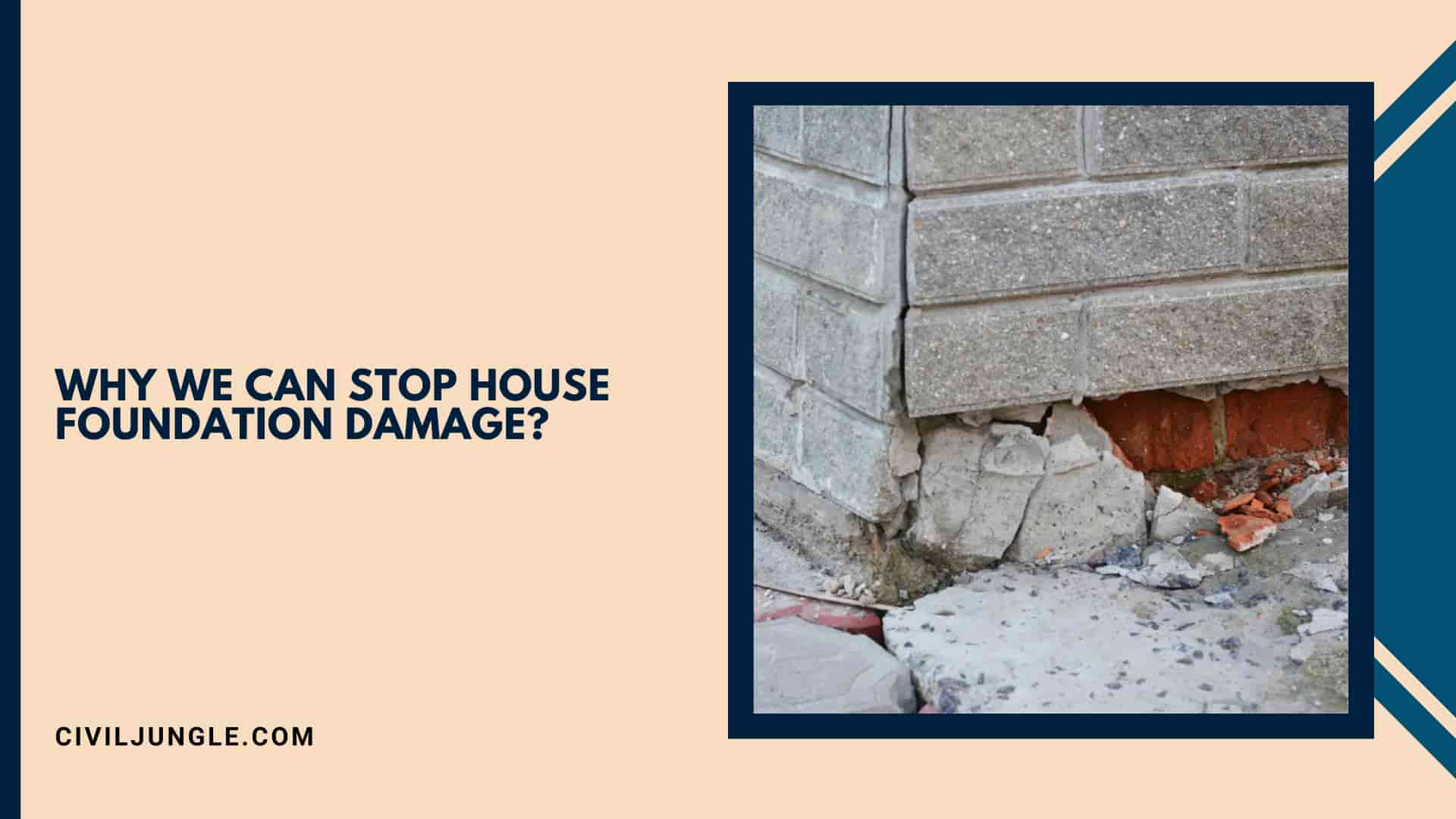Why the Need for Foundation Repair in Plano?
Important Point
Soil shifts can occur as a result of unusually dry or rainy weather, which can result in foundation problems. Because the types of soil in Plano get a large concentration of clay, contracting soil can allow cracks to form in dry weather.
Cracks might form as a result of the pressure put on your concrete slab by settling. Certain house settling is to be expected, and minor cracks aren’t usually caused for alarm.
Yet, if you see alterations in door jams, frames, or even drywall fractures, there was a strong probability your home has a foundation issue that has to be addressed by a professional.
In addition, wet weather might have a negative impact on your soil. As a result of excessive ground saturation, water may find a passage beneath the internal area of your concrete slab when abnormally high water levels are present around your foundation.
This loss of support can lead your slab to lose its initial level. Even small adjustments made in the incorrect places can significantly harm your home.
Protection is an issue that needs to be prioritized. Consider constructing an efficient drainage structure that incorporates both area or French drains if you find moist areas surrounding your foundation.
It will direct excess water from the foundation and over to the road. A minor adjustment like this can act as a wonderful “insurance policy” against potentially significant problems in the future.
The foundations of houses in this area are prone to foundation shifting. This is owing to the clay soils on which they are planted. This region’s earth is incredibly active and deep.
Volatile clay soils are notorious for inflating when wet and shrinking when dry. They create structural foundation damage because they constantly expand and shrink. This includes fissures in the slab foundation. It’s critical to halt this trend since it endangers housing foundations.
This seems to be applicable in Plano as well as the surrounding areas. Your structure can be stabilized by using pressed concrete foundation piers or steel foundation piers.
To the point of refusal, interior/exterior piers are built. Depending on the soil beneath your foundation, this could be 12-16 feet deep or even deeper.
The climate has a significant impact on foundations in this location. It has the potential to cause foundation fissures. Droughts, 105-degree temperatures, and heavy rain all cause problems. Learn more about foundation repair, hot weather, and cracks.
As a result of settling, house foundations and other residential structures in Plano frequently require foundation service. Extreme heat or wetness might cause these difficulties. The DFW area receives about 35 inches of rain each year in some areas.
The region got approximately 65 inches of rain in 2018. Flooding can also cause the foundation to heave. This can raise the foundation of your house by little enough as 1 inch or as much as 4 inches.
Moisture is among the most likely reasons for foundation problems, according to structural engineers. It’s usual for landowners in Plano to find that they will need home foundation repair service since it weakens a concrete slab and creates degradation.
Defects in the plumbing system (especially leaks underneath the slab) are also a cause of concern. It’s not uncommon for them to go undetected for decades before causing major damage. These leaks must be repaired immediately. this causes slab foundations to crack over time.
Foundations including crawl spaces can also be destroyed. Moisture can cause wood decay, sinking flooring, as well as other issues in a building. Leaks have a negative impact on the foundation.
All around the metroplex, particularly in Plano, they cause massive cracks and hairline fractures in the foundations of residential homes. As a result of plumbing pipe breaks, slab foundations as well as pier and beam foundations are often in need of foundation repair.
Sanitary water and sewage systems that are not working properly can require costly repairs. As a result, it could have a huge effect on your home.
The Types of Problems Foundation Repair Specialists Resolve
Foundation shifting, sheetrock fractures and external gaps are just a few of the problems that these companies fix. Contractors can also fix sloping floors, crooked chimneys, and worktops that are not level. Remind yourself that gaps less than 1/8′′ wide can cause serious problems.
When Plano homeowners hire a competent foundation repair contractor, house leveling can be quite effective. Also on the list of things that specialists can fix are cracked tiles, uneven door frames, and cracks around windows and doors.
Installing or altering foundation shims can remedy minor difficulties when working on house foundations in Plano. This is something that foundation repair businesses do frequently. 3/8′′ stainless shims are used by contractors to elevate houses.
All around the DFW metroplex, Plano contractors utilize these tools to repair concrete slabs and pier-and-beam foundations. In addition to damp crawl spaces, we can also address the problem of creaky flooring associated with pier and beam construction.
Sealants and Masonry Patches
In certain cases, cracks in a home’s foundation can be remedied by patching them and coating them with a waterproof sealant. Because your foundation supports your entire house, it’s crucial to spot and repair cracks as soon as possible.
Hydraulic cement, vinyl concrete, epoxies, silicone, or polyurethane are some of the most commonly utilized sealants for cracks that are small in size.
If the crack is severe, the type of mixture to be employed will depend on its severity In order to prevent water intrusion and further damage, identify the problem early and remedy it.
Slab Jacking
Using slab jacks, concrete that is uneven or sinking can be raised. Mudjacking, concrete lifting, and slab leveling are some terms used to describe this technique. When it comes to little projects, this strategy is great.
When the soil beneath changes or collapses, leaving empty spaces below, slab foundations sink or tilt. In order to repair a home foundation that is settling, professionals have access to the tools and local soil conditions necessary.
Slabjacking is a method of lifting concrete foundations that involves drilling 2″ holes into the sunken regions below. The space is filled with a solution of natural components (soil, cement, etc.). With each expansion of the solution, the fallen slab is raised back to its original location.
Piling
Concrete piers, pressed pilings, steel piers, and bell bottom piers are some examples of piling types used for foundation repairs. These methods are long-term solutions to foundation problems and do a better job of returning your home’s foundation to its original level than slab jacking.
Also Read: What Is the Strongest Foundation for a House And Their Types
Why We Can Stop House Foundation Damage?
Close to your home, you may have trees or plants that are a nuisance. As a result, the soil around the plants becomes drier.
For it to remain solid and strong, your foundation relies on a moisture balance. It is less likely to provide this support when the soil is bone-dry.
There’s a remedy to this difficulty, fortunately. Your outdoor plants and shrubs should be watered on a regular basis. Your foundation will be protected as well.
Your foundation might be damaged by some types of residential construction projects. Renovations that add weight to your home are a prime example of this.
Someone has a local foundation repair business to examine your home when you embark on a large home renovation project. Renovations may probably cost you more of it than they budgeted for if you’re not careful.
Grading and gutters are two of its most ignored measures to safeguard your foundation, however, they are among the most important.
This relates to the soil around your property that we discussed before. The less of it there is, the more stress is put on your foundation. Swiftly running water erodes soil more quickly than any other force.
Your foundation might also be weakened by standing water after a heavy downpour. This is why we recommend all homeowners grade their property and get their gutters cleaned twice a year. In the years to come, the money you invest will pay for itself many times over.
If your home’s foundation is in difficulty, there are usually a number of signs that something is wrong. Cracks along your home’s perimeter, doors that are difficult to open or close, and sagging or buckled floors are some of the most frequent items to check for. DFW Foundation Repair Contractors can help if you notice any of these concerns.
Also Read: Driven Pile Foundation
You should be aware of the following five warning indicators
- Fractures or voids in the structure’s foundation
- Interior doors that scrape the floor or are difficult to close can be a sign of a problem.
- A chimney that is tilting.
- Sticking or cracking windows is a common problem.
- No more level floors.
Frequently Asked Questions(FAQ):
Why Does My Home in Plano Need Foundation Repair?
Homes in Plano often need foundation repair due to the area’s clay-rich soil, which expands and contracts with changes in moisture levels, leading to soil shifts and foundation issues.
What Causes Soil Shifts and Foundation Problems in Plano?
Soil shifts can occur due to unusually dry or rainy weather. The clay soil prevalent in Plano contracts when dry, causing cracks, and expands when wet, exerting pressure on the foundation.
How Can I Tell If My Foundation Has Problems?
Signs of foundation issues include cracks in walls or floors, doors and windows that stick or don’t close properly, visible shifts in door jams and frames, and uneven floors.
Like this post? Share it with your friends!
Suggested Read –



Leave a Reply